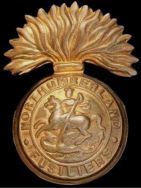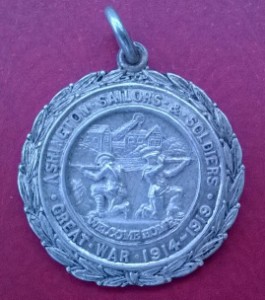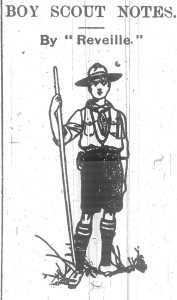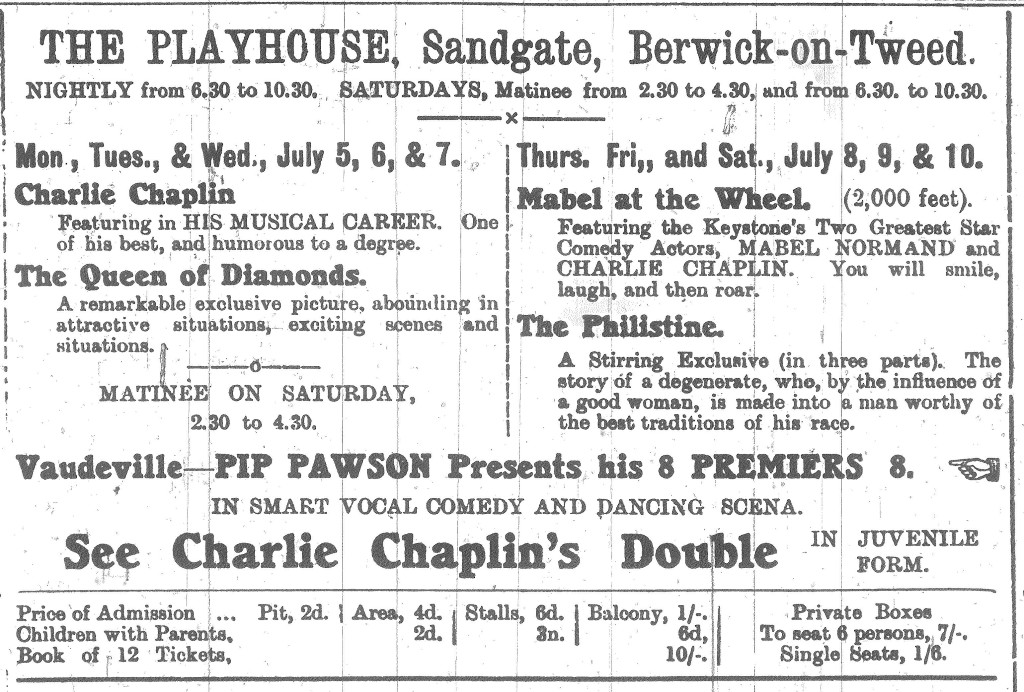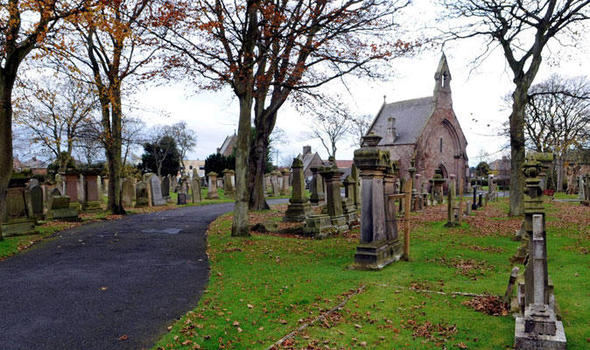BERWICK ADVERTISER, 9th JULY 1915
DISTINGUISHED SERVICE MEDAL FOR BERWICK LAD
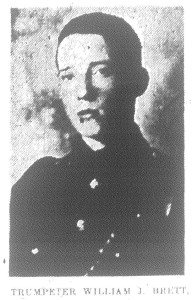
Congratulations to Trumpeter Wm. J. Brett, 72nd Battery of the Royal Field Artillery, who has, through his bravery, been recommended for the Distinguished Service Medal. Trumpeter Brett is the youngest son of Barrack Warden P. Brett, K.O.S.B. Berwick, and Mrs Brett, Wellington Cottage, Quay Walls. Trumpeter Brett, who is only 18 years of age, joined the Royal Field Artillery, about three years ago. He has been at the front since the beginning of the war, and last Friday arrived home on four days leave. On the way home he was informed by his officer that he had been recommended for the D.S.M. for the following brave action:- Trumpeter Brett was out on field telephone service and from his point of observation he saw three companies of Germans a little over a mile away quickly advancing towards his battery. Very pluckily Trumpeter Brett remained at his post until he got word through to his officer that the Germans were approaching. A gun was quickly mounted at a level crossing and the German companies were practically wiped out. Had it not been for his promptitude and pluck in remaining to send the message in all likelihood his battery would have been taken by surprise, the consequences of which can be imagined. Mr and Mrs Brett have good reason to be proud of the achievement of their youngest son. Their eldest son, Gunner P.J.G. Brett, is stationed at Jahasi, India, with the 79th Battery of the R.F.A. It is interesting to note that Trumpeter Brett’s paternal grandfather, who was in an Irish regiment, held the Crimean Medal; while his maternal grandfather, who served for 37 years in the East Surreys and Border Regiment, held the Maori Medal. Trumpeter Brett left for the Front on Monday at midnight, and we wish him good luck and a safe return.
CAMPS LIBRARY
Mr Toohey, Customs Office, Berwick, has received the following letter from the Hon. Mrs Eva Armstrong, secretary of the Camps Library:- “Thank you so very much for your kind letter. We are most grateful to you for all the books you are sending us, and for the great help you give us by receiving and dispatching these. I think you will probably get a good many books from Lady Clementine Waring, so if you will forward them to us we shall be much obliged. I think it is an excellent idea to have advised the local scouts that you are receiving books for us through the medium of the Press, and I am sure they will be glad to send you any they collect.” Mr Toohey begs to thank the following for gifts of books:- Lady Clementine Waring, Lennel; Mrs F.W. Wilsden, The Elms, Berwick; Mr R.A. Donaldson, 25 East Street, Berwick; and Mrs Matheson, 3 Devon Terrace, Berwick. Further gifts of books will be gratefully received at the Customs Office, Berwick.
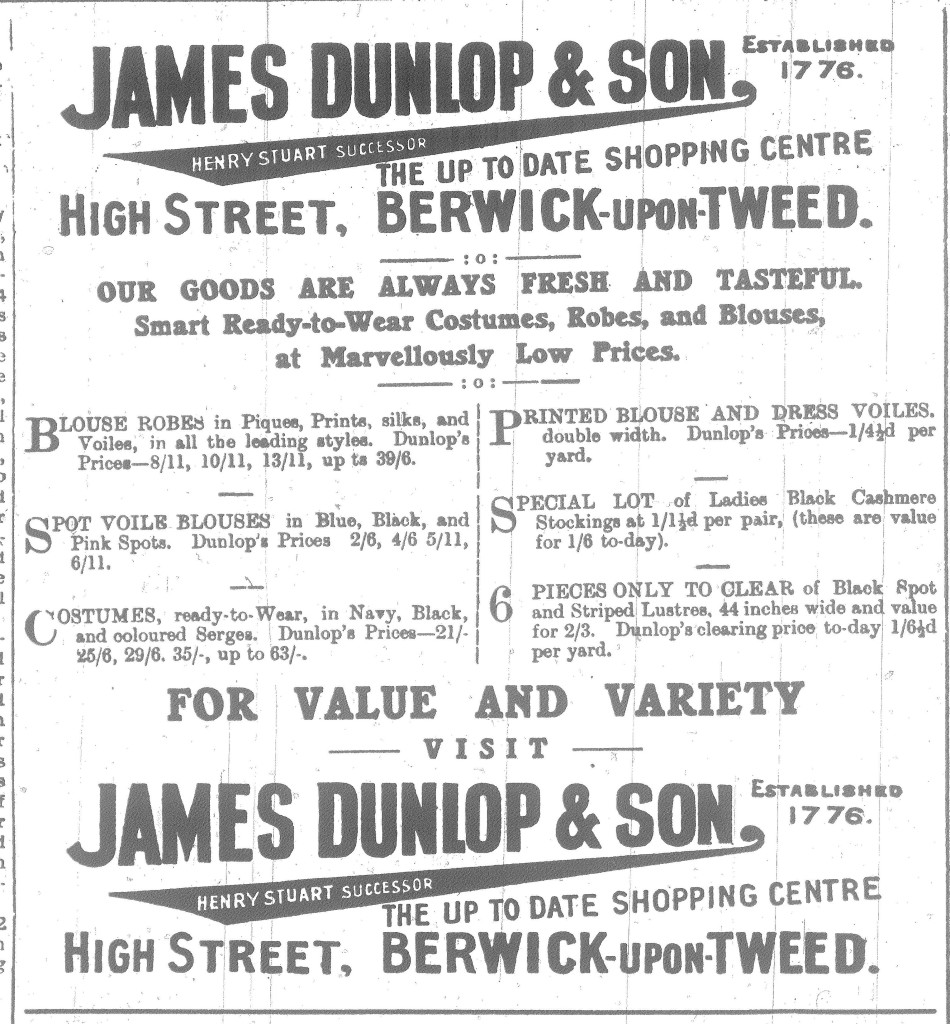
WHAT WOMEN CAN MAKE AT HOME
Pretty Dress that Looks Well and Costs Little
Everybody is talking about saving and investing, chiefly in connection with the new and evidently popular War Loan, but many, thrifty housewives and sensible girls are investing 6½d each week in our deservedly popular paper patterns which not only enable them to make pretty and serviceable garments at home, but to save money on the cost of buying ready-to-wear things which so far as cut
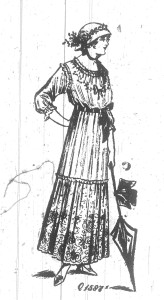
and style go, are not to be compared with the same articles built on the lines of our patterns at home.
A pretty idea for a summer frock will be found in sketch No.1587. Quite a number of pretty dresses this season are made of deep embroidery flouncing of voile, muslin, or lace, and the effect is always dainty and charming. No doubt the full skirts have defeated the demand for flouncing and the consequent charm or our new frocks. But a little change has been evolved in the design here presented, by placing the flouncing, with prettily gathered heading, on a well shaped upper skirt part. This is a good idea for it takes away the bulk of material which to the full length flounce skirt, and which is not becoming to all figures.
The material for the bodice and upper skirt should correspond in texture with the flouncing of the lower skirt. Plain voiles and crepes can be obtained which will “go” with flouncing of these materials, also plain lawns and muslins for embroidery cotton goods. The quantities for the realisation of our pretty design are as follows:- Of 18 to 20 inch flouncing, 3 yards; of plain double width material, 3 yards-this being apportioned in this way, 1½ yards for the bodice, and 1½ yards for the upper skirt.


